Vintage Treasures: The Bard Series by Keith Taylor
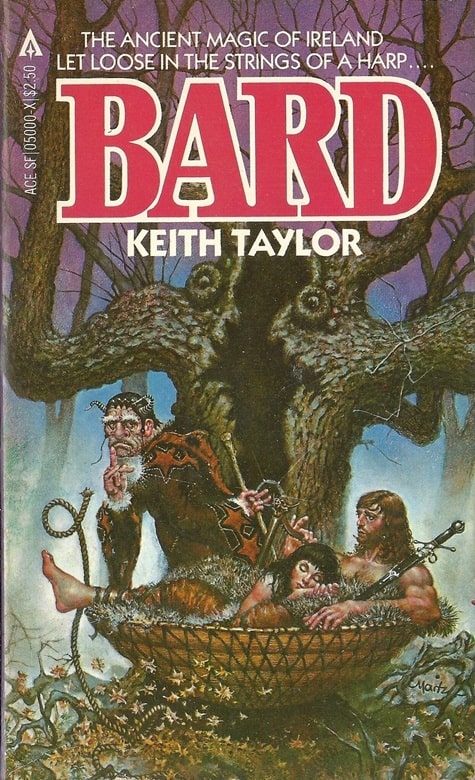 |
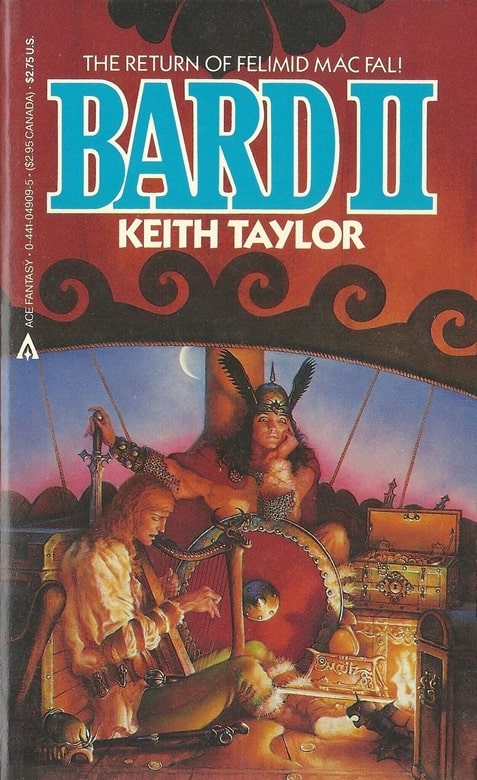 |
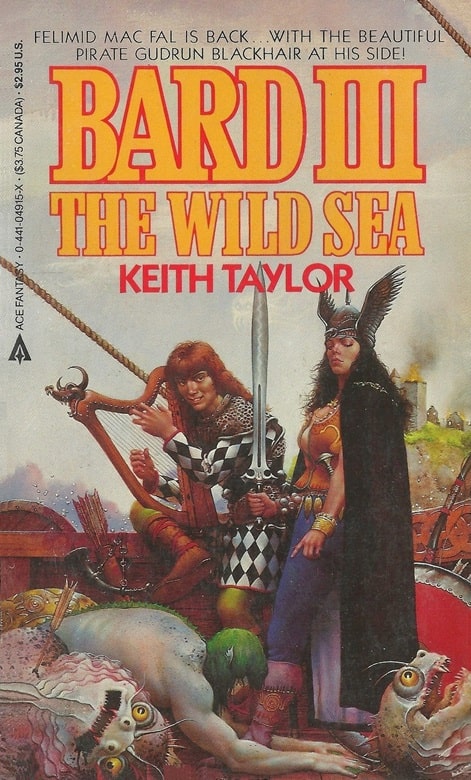 |
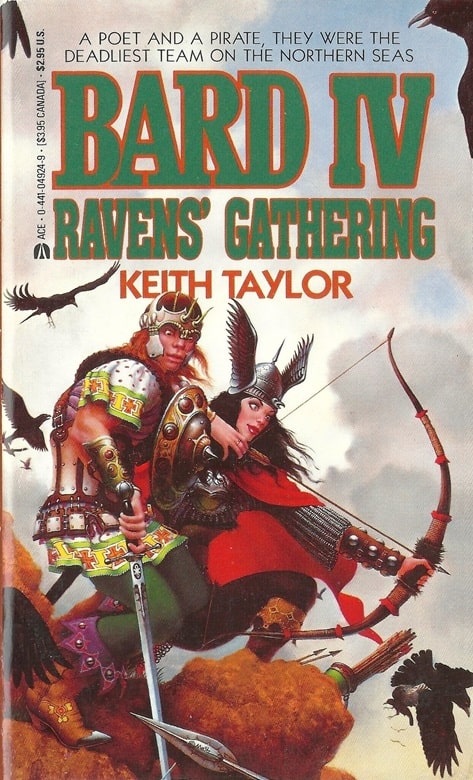 |
Bard, Volumes I-IV (Ace Books, 1981-97). Covers by Don Maitz
In October 1975 an unknown author named Dennis More made his debut in Fantastic magazine with “Fugitives in Winter,” the rousing tale of Felimid mac Fal of Eire, a bard whose tools are his ancient harp Golden Singer, and his magic sword, Kincaid. Eight more tales of Felimid followed, in places like Fantastic, Weird Tales, and Andrew Offutt’s Swords Against Darkness.
‘Dennis More,’ as it turned out, was Australian writer Keith Taylor, who began writing under his own name with the story “Hungry Grass” in Swords Against Darkness V (1979). In 1981 Taylor collected four of his early Felimid stories — along with a brand new novella — in the fix up novel Bard, which Fletcher Vredenburgh called “a perfect artifact from the glory days of 1970s swords & sorcery.” It spawned a long-running series that lasted five volumes (with rumors of a sixth in the pipeline).
[Click the images for louder versions.]
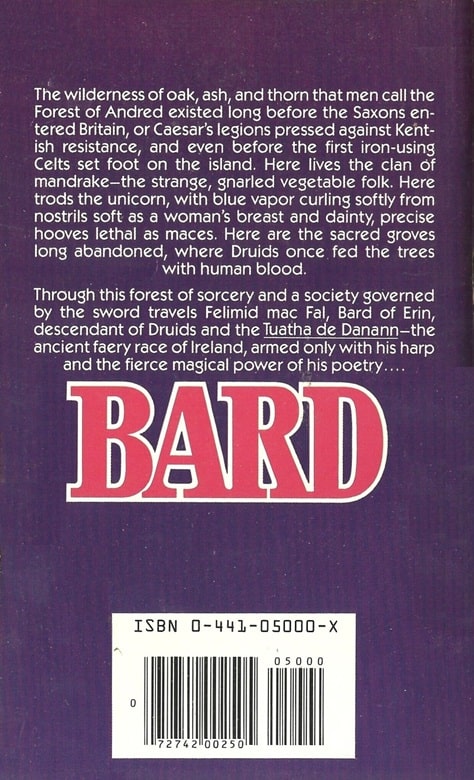 |
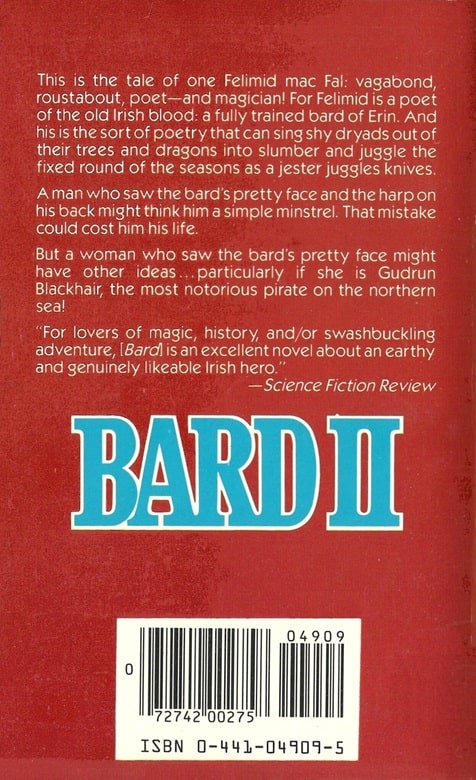 |
Back covers for Bard, Volumes I and II (Ace Books, November 1981 and April 1984)
Black Gate blogger Brian Murphy discussed Bard and its sequels in an excellent piece, Under the Spell of Keith Taylor’s Bard Songs, published by the Tales From the Magician’s Skull crew over at Goodman Games last year.
A characteristic of good sword-and-sorcery is earthiness… over [a] layer of grit, which serves to ground the reader somewhere recognizable and to spare overly tedious worldbuilding, the skilled sword-and-sorcery writer adds in the fantastic, in small doses. Weird monsters and dark sorcery that feels alien, and dangerous, and when it appears casts its spell upon the reader.
Keith Taylor struck this balance with the skill of a well-practiced king’s court lutist in his stories of Felimid Mac Fal, better known as Bard. Taylor wrote several stories of the wandering Bard of Erin, published as Bard I-V. The stories take place amidst the backdrop of early sixth century Britain, shortly after the Battle of Badon, in which the greatest Saxon warhost ever gathered on the isle was beaten by the native Britons and their warleader, Arthur. Ruined Roman villas dot the landscape as fierce Jutes raid and plunder.
Felimid is the descendant of Druids and the legendary Tuatha De Danann. But he’s also flawed, and mortal, and three-dimensional, playful and lusty, with a weakness for women. When we meet him in Bard he has succeeded in pissing off the Jutish king Oisc with his sharp tongue, for which he’s bound hand and foot and hoisted over a pit of hungry wolves for the sport of the hall. Felimid can be compared with the likes of Jack Vance’s Cugel the Clever — far less bastardly, but when provoked is quick to defend his honor with a cutting verse, or if need be the edge of his blade. He’s a reluctant hero but a skilled and deadly swordsman, and bears with him on his journeys two artifacts of power — the sword Kincaid, and his harp Golden Singer, with which he can not only spin mesmeric tales, but also cast spells of sleep, and laughter, and sorrow upon its listeners.
We’ll get back to Brian’s piece in a bit.
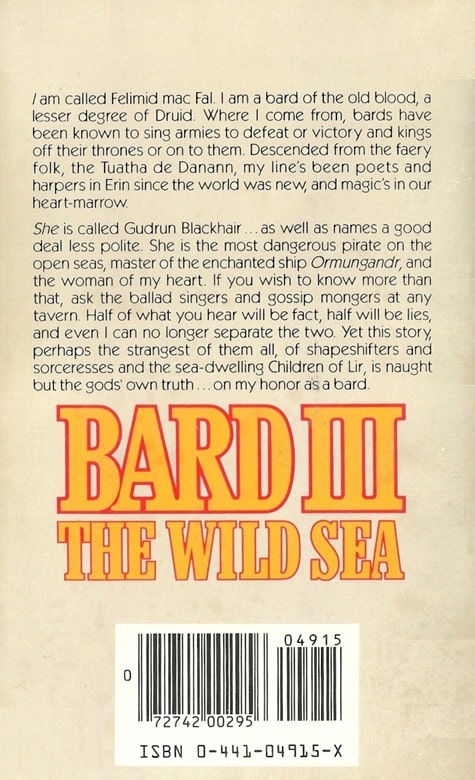 |
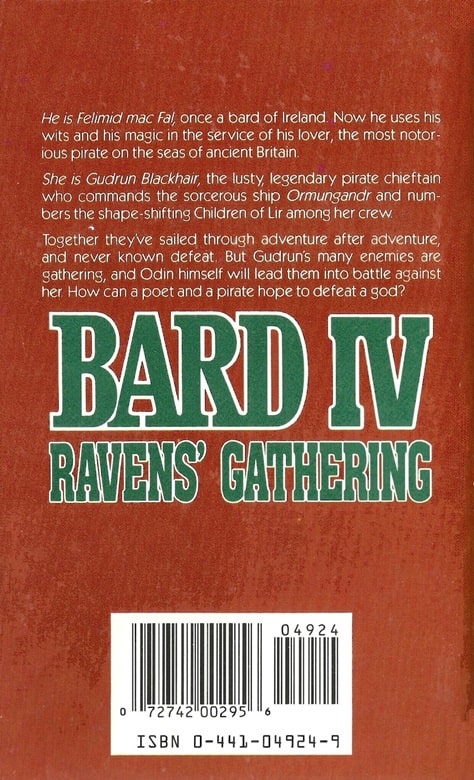 |
Back covers for Bard, Volumes III and IV (Ace Books, June 1986 and November 1987)
Not too surprisingly, my man Fletcher has the best overall summary, in his 2014 review of Bard here at Black Gate.
Bard is a fix-up of four previously published stories and one original tale about Felimid mac Fal of Eire, wielder of the magic sword, Kincaid, and player of the ancient harp, Golden Singer. Under the right circumstances, the harp allows him to cast spells and play songs to influence his audience. Blessed with talent, wit, and cunning, Felimid is able to enter the courts of ferocious Jutish warlords and survive encounters with monsters and sorcerers in haunted forests.
Though tied together by a pair of ongoing plots, Bard reads more like the scattered adventures of a peripatetic traveler than a novel. Despite its melancholic setting in a time of fading magic and invaders from across the sea, this book is tremendous fun. Felimid is a bold, lively character with a winning way, well worth any heroic fantasy reader’s time…
Giant spiders, goblin-men, a conniving wizard, and a divine horse all make their appearances in “The Forest of Andred,” the story of Felimid’s and Regan’s further adventures in the magic wood. To survive, all of the bard’s powers of playing, swordsmanship, and cunning are put to the test in this tale.
“My Sendings Return” is Bard’s longest story. Leaving the forest, Felimid seeks shelter from his enemies with friends in the walled British town of Calleva. Within the confining stone walls of the town, Felimid’s magic is weak. The king of Calleva’s son wants him dead, forcing him to be more circumspect than usual. His silver-hilted sword attracts the attention of thieves. With the aid of black magic, it’s stolen out from under him one night….
Enjoy Fletcher’s complete review here.
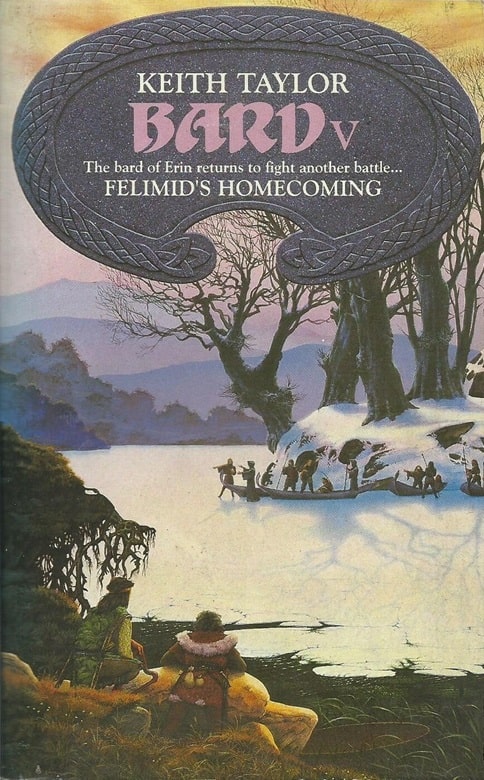 |
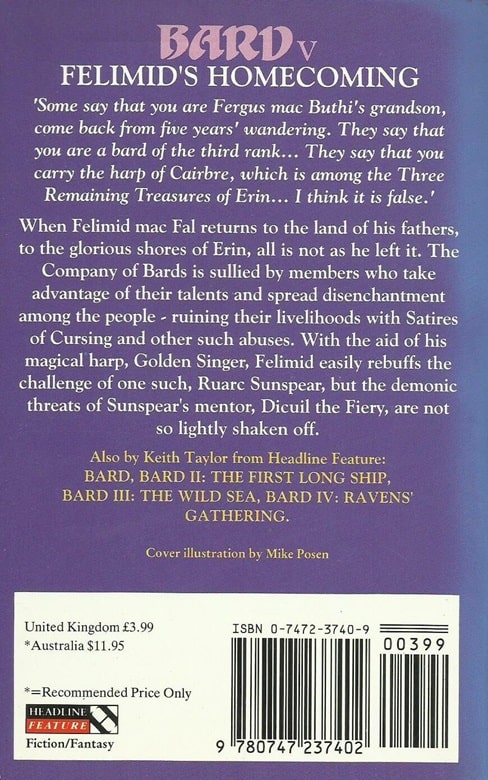 |
Bard V: Felimid’s Homecoming (Headline, November 1991). Cover by Mike Posen
As long as I’m quoting helpful articles, I would be remiss to overlook G. W. Thomas’s 2019 catalog of the early tales of the bard, at his excellent online magazine DarkWorlds Quarterly.
“The Forest of Andred” (Fantastic, November 1976)… With Regan falling ill, Fel searches the dark forest for food. He comes across a giant spider that he kills, but sprains his ankle in the fight. The bard encounters a strange looking man named Pendor, a wizard, who patches up the pair. During their convalescence, a stranger on a beautiful horse appears, a rich hunting lord with a band of pig-faced killers. He is Lord Avraig and he demands Felimid’s life in lieu of the spider, an adversary he wanted to kill…
“Buried Silver” (Fantastic, February 1977) … The novella features a set of Bulgars working for a Roman named Sergius. Fel encounters him in a British village of where the locals have sent a woman named Celia away as the “carline,” a mock sacrifice to heathen gods… Sergius and his huns force their way beyond the palisade, abuse their hospitality and the local women, but no one can stop them, not even Fel. Sergius strikes Fel for insolence then takes his sword, Kincaid… Fel gets his revenge when he uses his harp to magical render the newcomers into blubbering heaps.
“On Skellig Michael” did not appear in Fantastic, but around the same time in Swords Against Darkness II (1977), edited by Andrew J. Offutt. This short episode is not included in Bard. The bard is stranded on the island of Skellig Michael, where a church of Christian priests is at odds with the sea-dwelling Selchies near-by. The priests refuse to admit the existence of the sea-folk’s souls. The Selchies show Felimid respect because he is a bard, a lesser form of druid. They give him a boat so he can escape…
So who was this Dennis More? He is, in fact, Australian Fantasy author, Keith Taylor… Never [prolific], Taylor has written a small number of novels and stories that show the same high marks of quality that the Dennis More tales first displayed, well researched, character-driven, with a love of magic and the wonderful. Whether he was writing on Dark Age Britain, ancient Egypt or Ireland, Taylor has been about quality over quantity. He has won and been nominated many times for Australia’s Ditmar Award.
Read G.W. complete notes at Dennis More and the Tales of a Wandering Bard.
The five tales of Felimid in Bard (originally published under the name Dennis More) include two long novellas, “Buried Silver” and “My Sendings Return,” and three short stories. They are:
“Fugitives in Winter” (Fantastic, October 1975)
“The Atheling’s Wife” (Fantastic, August 1976)
“The Forest of Andred” (Fantastic, November 1976)
“Buried Silver” (Fantastic, February 1977)
“My Sendings Return” — original
The uncollected stories of Felimid are:
“On Skellig Michael” (Swords Against Darkness II, 1977) — as Dennis More
“The Demon Cat” (Weird Tales, Winter 1989/1990) — as Keith Taylor
“The Brotherhood of Britain” (The Camelot Chronicles, August 1992) — as Keith Taylor
“Night of the Burning Ghost” (Samhain Sorceries, September 23, 2022) — as Keith Taylor
I’m grateful to Deuce Richardson, who tracked down the uncollected Bard tales for a 2021 blog post at DRM Books, The ‘Lost Tales’ of Keith Taylor.
“On Skellig Michael” — in Swords Against Darkness II — was the first appearance of Felimid in mass market paperback and the first story of that Irish bard I ever read. However, it is — so far — the last story of Felimid chronologically. He’s in his late forties in that tale.
“The Demon Cat” is a short, but powerful, tale. Chronologically it is the very first tale of Felimid. He’s just left the bardic school of Erin and runs into serious trouble. “The Demon Cat” was published in the Winter 1989/1990 issue of Weird Tales.
The final unreprinted story of Felimid is “The Brotherhood of Britain,” which appeared in Mike Ashley’s excellent anthology, The Camelot Chronicles.
Keith Taylor, who turns 77 next month, has been coping with a long illness, but recently has returned to writing. Plenty of folks have written about his most recent fiction efforts. But for the most informative summary, let’s return to Brian’s Murphy’s September 2022 piece at Goodman Games.
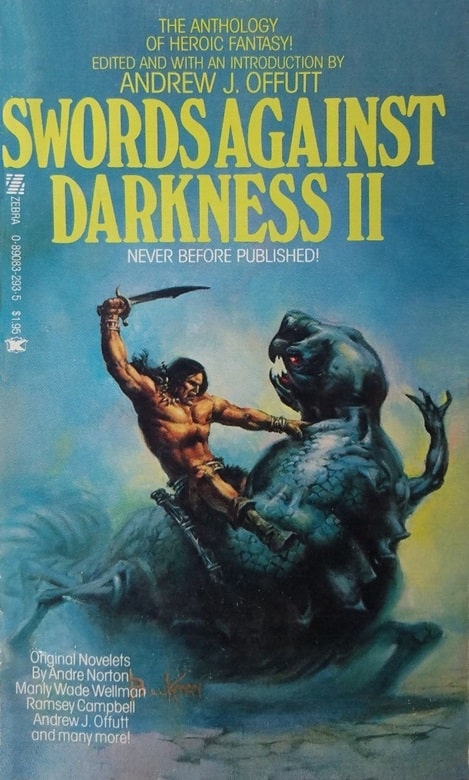 |
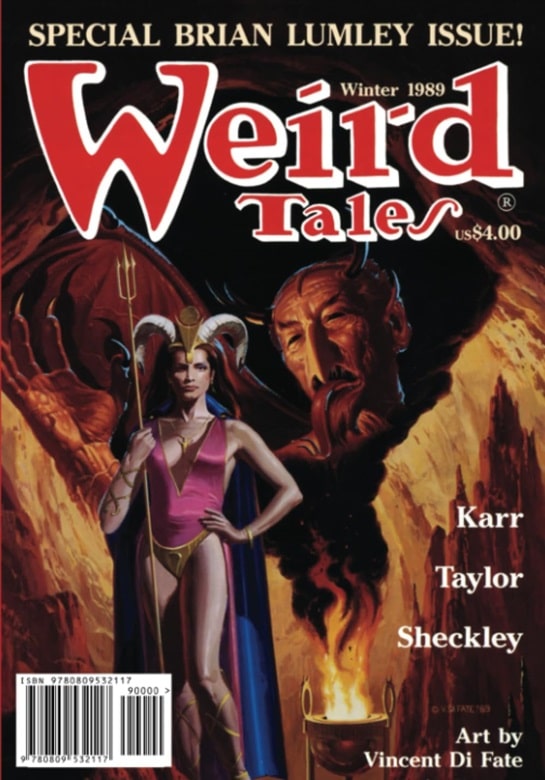 |
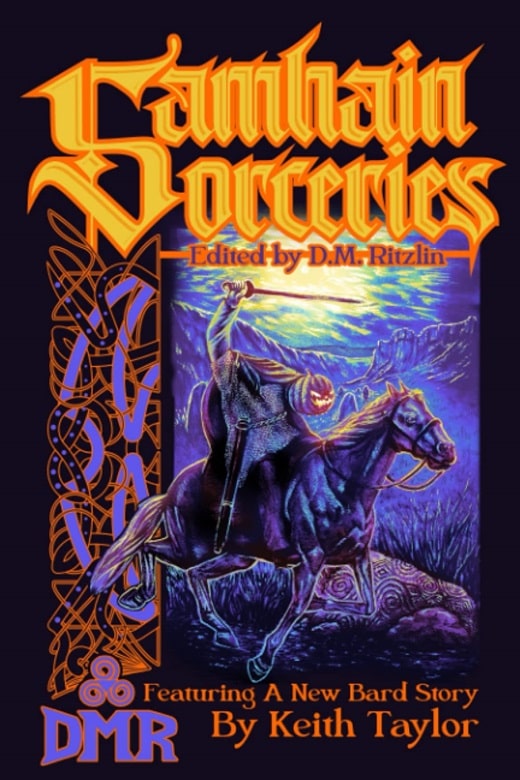 |
Anthologies and magazines containing uncollected Bard tales: Swords Against Darkness II
(Zebra Books, September 1977), Weird Tales, Winter 1989/1990, and Samhain Sorceries
(DMR Books, September 23, 2022). Covers by Larry Kresek, Vincent Di Fate, and Lauren Gornik
Here’s Brian again.
DMR recently republished in the fine Renegade Swords II two stories featuring Felimid’s father, Fal the Reiver, which originally appeared in a later revival of Weird Tales in 1988. These two stories, in particular “The Unlawful Hunter,” are terrific sword-and-sorcery, very well written and wonderfully entertaining. Taylor turns a neat trick in his story of introducing a truly monstrous hag, who murders two of Fal’s friends after a botched cattle raid. Fal discovers that the hag does not operate according to commonly understood myth. “The legends were wrong,” Fal realizes. With this deft touch Taylor makes the monstrous and magical feel real in this tale of comeuppance and the end of youthful innocence.
Taylor, who has reportedly been battling a lengthy illness, recently reported on the blog of DMR books that he is currently working on a sixth Bard novel, which is great news indeed. And he has a new story, “Written in Lightning,” in the new sword-and-planet anthology The Lost Empire of Sol.
While they were out of print for many years, Keith Taylor’s Bard novels have a stalwart following among sword & sorcery fans, which included my close-knit group of friends in Ottawa who kept foisting the first novel on me. As usual, I avoided it until I had the complete set, which I believed included four novels.
Of course, shortly after I acquired a complete set, I learned there’s a fifth book, published in the UK: Felimid’s Homecoming. Fortunately it has finally been reprinted in the US, so in theory at least there’s nothing stopping me from finally starting Bard.
Here’s the publishing deets for all five novels.
1) Bard (293 pages, $2.50 in paperback, November 1981)
2) Bard II (260 pages, $2.75 in paperback, April 1984)
3) Bard III: The Wild Sea (202 pages, $2.95 in paperback, June 1986)
4) Bard IV: Ravens’ Gathering (235 pages, $2.95 in paperback, November 1987)
5) Bard V: Felimid’s Homecoming (280 pages, £3.99 in paperback, November 1991)
The first four volumes were paperback originals from Ace Books, all with covers by Don Maitz. Headline reprinted the books in the UK starting in 1989, and in 1991 was the first to publish Felimid’s Homecoming.
Speaking Volumes began reprinting the books in the US in April 2020, in trade paperback and digital formats, and in November 2020 was the first to publish Felimid’s Homecoming in the US.
See all our recent Vintage Treasures here.
Have yet to read Taylor’s Bard series, but his Servant Of The Jackal God is a spooky and fun collection through a darkly magical ancient Egypt.
Sven,
I’m glad you mentioned Servant of the Jackal God, since I was completely unaware of it until I started researching this article. It’s a collection of a dozen tales, three original and nine which appeared in Weird Tales between 1999-2006 (mostly in the DNA Publications incarnation).
I found Deuce Richardson’s review at the DMR blog earlier today, and the book sounds absolutely terrific:
https://dmrbooks.com/test-blog/2017/12/27/servant-of-the-jackal-god-by-keith-taylor
Here’s a small excerpt:
“Servant of the Jackal God… takes place in the same universe as most of his fiction, which includes tales of Felimid mac Fal of the Bard series… Kamose is a man whose reach exceeded his grasp… just barely. He went against the Egyptian god, Thoth, and was lucky to escape with his life and soul intact. Servant of the Jackal God picks up decades after that cataclysmic event. Kamose has returned from exile and become a priest of Thoth’s rival, Anubis. He has risen very high in the priesthood and is an important figure at Pharaoh’s court, where the priests of Thoth seek to bring him down…
The stories — which take place over the course of about two years — follow Kamose as he fights the machinations of rival wizards, priests and Thoth Himself. Along the way, we also read tales of Kamose’s henchmen as they do his work. Chief amongst them is Si-Hotep, an honest thief caught up in the doings of wizards.”
Thanks for rec, Sven! It definitely sounds like something I need to check out.
Do you need to read the books in order? I have number four only.
Matthew,
Great question. I don’t think so, but maybe someone in the audience who’s read that far in the series can give us a definitive answer.
I would recommend reading them in order. As I noted in a DMR post, you can get away with starting with Bard II, but the second, third and fourth novels form a pretty solid trilogy. Despite the first Bard being a ‘fix-up novel’, there are reverberations from it in the next three.
From Keith himself on FB, a couple weeks ago:
‘For one thing I have been working hard on a novel titled BARD VI: SUNSPEAR, which is now finished and has been sent off to my agent, Ms. Cherry Weiner. We both hope it’ll appear as an e-book and audiobook.’
Bob,
Fantastic news! Thanks for sharing that. I was able to track down the original Facebook post from November 13:
https://www.facebook.com/groups/607795792693392/posts/2782863418519941/
I note that Keith also mentions the new Nasach story he has in Jason Waltz’s NEITHER BEG NOR YIELD, and his story in Darrell Schweitzer’s new anthology SHADOWS OUT OF TIME. Here’s the text:
“I have been working hard on a novel titled BARD VI: SUNSPEAR, which is now finished and has been sent off to my agent, Ms. Cherry Weiner. We both hope it’ll appear as an e-book and audiobook.
As Jason Waltz has announced here, he’s launching an antho of badass sword and sorcery called NEITHER BEG NOR YIELD, and there’s a fresh short story in it by yours truly, about that tough escaped slave Nasach who is still fighting his way back to his home coasts in what is present day County Kerry. Neither begging nor yielding. Just recently, too, like a month ago, Darrell Schweitzer’s anthology of Lovecraftian stories, SHADOWS OUT OF TIME, was released, one of the contributors being me with “The Rocks of Leng.” Both to my great pride.”
cool!
I loved the Bard novels. Cracking good stories that reminded me of the Cormac MacArt tales by Andrew J. Offutt which I was reading about the same time.
I particularly liked late antiquity/dark age setting .
David,
Funny you should mention Andrew J. Offutt’s Cormac MacArt novels. After publishing two stories in Offutt’s Swords Against Darkness anthologies in 1977 and 1979, Taylor became a co-writer on the last two Cormac MacArt novels, numbers 6 and 7 in the series:
When Death Birds Fly (1980) — written with Andrew J. Offutt
The Tower of Death (1982) — written with Andrew J. Offutt
For a lot of fantasy readers that was their first introduction to Keith Taylor.
Thanks for this article on Keith Taylor. I have never read the Bard books but the Cormac Mac Art books were terrific. I remember buying and reading “The Tower of Death” about 40 years ago. And enjoyed all the others. How could you not buy a book with the title “When Death Birds Fly” and cover art like that – gotta love the villain in black.
I probably knew that once upon a time but the memory banks are failing:)
I am going to have to go to Alibris and revisit both series.
[…] (Black Gate): Keith Taylor, who turns 77 next month, has been coping with a long illness, but recently has […]
Thanks for shouting out Keith’s Nasach is returning in NEITHER BEG NOR YIELD!
That’s a heckuva get, Mr. Waltz. Congratulations!